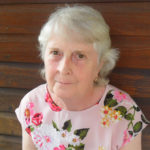My name is Annette Martyn, I’m married with two children and four beautiful granddaughters. I am a keen gardener but have to limit this activity to early mornings and late afternoons with rest in between. I have lived almost all of my life in North Queensland.
In 1989, aged 40, I was diagnosed with lupus. For six more years I presented with chest pains and shortness of breath but these symptoms were put down to lupus. Finally, in 1996, I was diagnosed with Interstitial Pulmonary Fibrosis (IPF). My IPF has a known cause, scleroderma, another symptom of lupus which has scarred the membranes in my lungs, restricting their expansion as I breathe. Following the diagnosis of IPF I had another 20 years of continuing symptoms including difficulty breathing when doing even mild exercise, pain and discomfort in my chest, high blood pressure, racing pulse, and feeling like my heart was about to burst, resulting in several stays in hospital.
Finally, in 2017, I was diagnosed with Pulmonary Arterial Hypertension (PAH) through an echocardiogram which was confirmed by a right heart angiogram. I now have a condition that can be controlled by drug therapy, despite uncomfortable side effects, and constant monitoring. I have been able to investigate and try to understand this disease.
As a result of my conditions, I fatigue quickly with mild exercise such as walking upstairs or on an incline. I also have insomnia and I wake during the night feeling like I have run out of air and can’t get back to sleep which probably adds to the fatigue. Some of the other day-to-day tasks like shopping or housework are sometimes too difficult to manage so my husband, who is my carer, takes care of these tasks. I find also that air-conditioning has an adverse effect on my breathing and I cannot stay in it for long periods, which limits many social events such as going to a movie.
I have to make constant trips to medical specialists, including the cardiologist and respiratory physician, to prove to the Federal Government that the drug I am prescribed remains funded on the Pharmaceutical Benefits Scheme (PBS). I couldn’t afford it otherwise – it’s too expensive.
When I was first diagnosed with PAH, exercise or physiotherapy wasn’t suggested. I was concerned and felt no one was interested in helping me. I’m now four weeks into a pulmonary rehabilitation course and I am hopeful of improvement.
The exercises strengthen core and limb muscles which aids breathing. On days when I’m feeling well, I do these during my daily routine of gardening and walking up and down our stairs. I also attend a Lung Disease Support Group in Townsville and I think I am the only member of the group with a rare lung disease. I often think, “surely I am not the only person in Townsville with Interstitial Pulmonary Fibrosis”. I am also part of Lung Foundation Australia’s Pulmonary Fibrosis Peer Connect service and am thankful to have connected with Marion – sadly she passed away in 2018. It is always nice to chat to someone who understands your situation and what you’re going through. I always look forward to Lung Foundation Australia’s LungNet Newsletter too as it keeps me informed about what is happening.
I find most people don’t understand lung conditions – what they are and what they mean. All they hear of is the more notorious illnesses such as cancer, and unless you are lying down gasping for breath, they assume you are well.
Although this is sometimes frustrating, you have to accept that and carry on as best you can. I think more research into lung disease will always be needed as we don’t know what we don’t know – only a few years ago there weren’t the drugs available to treat PAH that there are today, for example. I also think we need more community awareness – when people understand a problem they can deal with it much better.


